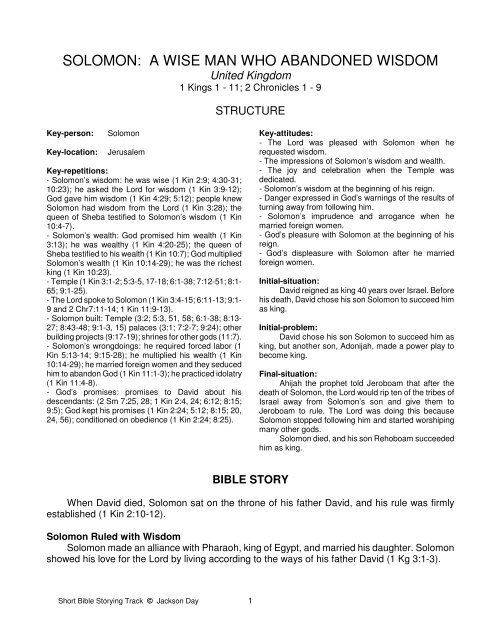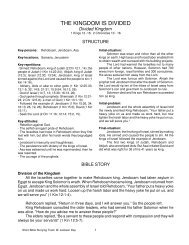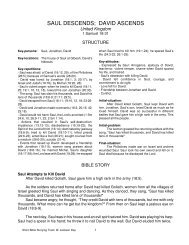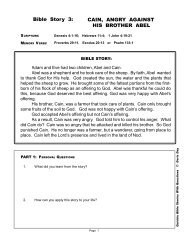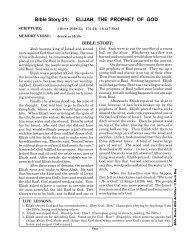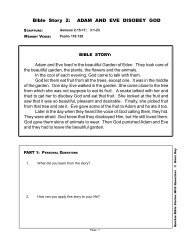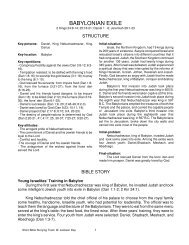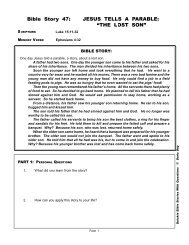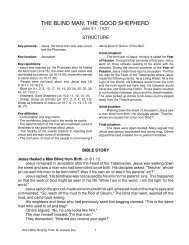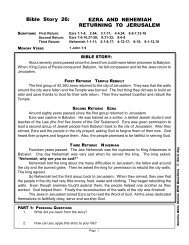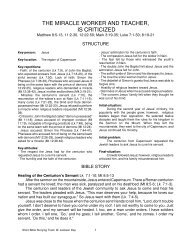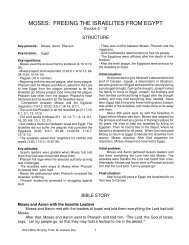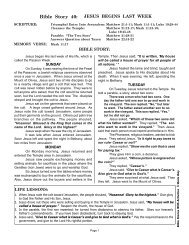Solomon - Bible Storytelling
Solomon - Bible Storytelling
Solomon - Bible Storytelling
Create successful ePaper yourself
Turn your PDF publications into a flip-book with our unique Google optimized e-Paper software.
SOLOMON: A WISE MAN WHO ABANDONED WISDOM<br />
United Kingdom<br />
1 Kings 1 - 11; 2 Chronicles 1 - 9<br />
STRUCTURE<br />
Key-person:<br />
Key-location:<br />
<strong>Solomon</strong><br />
Jerusalem<br />
Key-repetitions:<br />
- <strong>Solomon</strong>’s wisdom: he was wise (1 Kin 2:9; 4:30-31;<br />
10:23); he asked the Lord for wisdom (1 Kin 3:9-12);<br />
God gave him wisdom (1 Kin 4:29; 5:12); people knew<br />
<strong>Solomon</strong> had wisdom from the Lord (1 Kin 3:28); the<br />
queen of Sheba testified to <strong>Solomon</strong>’s wisdom (1 Kin<br />
10:4-7).<br />
- <strong>Solomon</strong>’s wealth: God promised him wealth (1 Kin<br />
3:13); he was wealthy (1 Kin 4:20-25); the queen of<br />
Sheba testified to his wealth (1 Kin 10:7); God multiplied<br />
<strong>Solomon</strong>’s wealth (1 Kin 10:14-29); he was the richest<br />
king (1 Kin 10:23).<br />
- Temple (1 Kin 3:1-2; 5:3-5, 17-18; 6:1-38; 7:12-51; 8:1-<br />
65; 9:1-25).<br />
- The Lord spoke to <strong>Solomon</strong> (1 Kin 3:4-15; 6:11-13; 9:1-<br />
9 and 2 Chr7:11-14; 1 Kin 11:9-13).<br />
- <strong>Solomon</strong> built: Temple (3:2; 5:3, 51, 58; 6:1-38; 8:13-<br />
27; 8:43-48; 9:1-3, 15) palaces (3:1; 7:2-7; 9:24); other<br />
building projects (9:17-19); shrines for other gods (11:7).<br />
- <strong>Solomon</strong>’s wrongdoings: he required forced labor (1<br />
Kin 5:13-14; 9:15-28); he multiplied his wealth (1 Kin<br />
10:14-29); he married foreign women and they seduced<br />
him to abandon God (1 Kin 11:1-3); he practiced idolatry<br />
(1 Kin 11:4-8).<br />
- God’s promises: promises to David about his<br />
descendants: (2 Sm 7:25, 28; 1 Kin 2:4, 24; 6:12; 8:15;<br />
9:5); God kept his promises (1 Kin 2:24; 5:12; 8:15; 20,<br />
24, 56); conditioned on obedience (1 Kin 2:24; 8:25).<br />
Key-attitudes:<br />
- The Lord was pleased with <strong>Solomon</strong> when he<br />
requested wisdom.<br />
- The impressions of <strong>Solomon</strong>’s wisdom and wealth.<br />
- The joy and celebration when the Temple was<br />
dedicated.<br />
- <strong>Solomon</strong>’s wisdom at the beginning of his reign.<br />
- Danger expressed in God’s warnings of the results of<br />
turning away from following him.<br />
- <strong>Solomon</strong>’s imprudence and arrogance when he<br />
married foreign women.<br />
- God’s pleasure with <strong>Solomon</strong> at the beginning of his<br />
reign.<br />
- God’s displeasure with <strong>Solomon</strong> after he married<br />
foreign women.<br />
Initial-situation:<br />
David reigned as king 40 years over Israel. Before<br />
his death, David chose his son <strong>Solomon</strong> to succeed him<br />
as king.<br />
Initial-problem:<br />
David chose his son <strong>Solomon</strong> to succeed him as<br />
king, but another son, Adonijah, made a power play to<br />
become king.<br />
Final-situation:<br />
Ahijah the prophet told Jeroboam that after the<br />
death of <strong>Solomon</strong>, the Lord would rip ten of the tribes of<br />
Israel away from <strong>Solomon</strong>’s son and give them to<br />
Jeroboam to rule. The Lord was doing this because<br />
<strong>Solomon</strong> stopped following him and started worshiping<br />
many other gods.<br />
<strong>Solomon</strong> died, and his son Rehoboam succeeded<br />
him as king.<br />
BIBLE STORY<br />
When David died, <strong>Solomon</strong> sat on the throne of his father David, and his rule was firmly<br />
established (1 Kin 2:10-12).<br />
<strong>Solomon</strong> Ruled with Wisdom<br />
<strong>Solomon</strong> made an alliance with Pharaoh, king of Egypt, and married his daughter. <strong>Solomon</strong><br />
showed his love for the Lord by living according to the ways of his father David (1 Kg 3:1-3).<br />
Short <strong>Bible</strong> Storying Track © Jackson Day<br />
1
<strong>Solomon</strong> went to Gibeon to offer sacrifices to God. The Lord asked him in a dream, “What<br />
do you want me to give you"<br />
<strong>Solomon</strong> requested, “O Lord my God, you have made me king in my father’s place. I do not<br />
have the wisdom to do my job. Give me a discerning heart to rule your people and to discern<br />
between right and wrong. Without wisdom, it is impossible to govern this great people of yours."<br />
The Lord was delighted and promised <strong>Solomon</strong> wisdom, and as a bonus: riches, honor and<br />
a long life (1 Kin 3:4-15; 1 Chr 1:2-12).<br />
Two prostitutes sought King <strong>Solomon</strong>. One said, “This woman and I live in the same house.<br />
I had a baby and three days later, this woman also had a baby. One night, the infant son of this<br />
woman died. She took my son from my bed while I was sound asleep. She put my son by her<br />
breast and put her dead son by my breast. The next morning, I got up to nurse my son, and there<br />
was this dead baby! But when I looked at him in the morning light, I saw that it wasn't my baby.”<br />
The other woman countered, “No! Mine is the living baby; yours is the dead baby!<br />
King <strong>Solomon</strong> requested, “Bring me a sword and cut the living baby in two; give half to one<br />
and half to the other."<br />
The real mother of the living baby pleaded with the king, “Please, my lord, give her the living<br />
baby! Don't kill him!"<br />
But the other one said, “If I can’t have him, neither will you. Cut him in two!"<br />
The king gave his ruling, “Give the living baby to the first woman. She is the real mother."<br />
People in Israel realized <strong>Solomon</strong> had wisdom from God to administer justice (1 Kin 3:16-28).<br />
<strong>Solomon</strong>’s Achievements<br />
<strong>Solomon</strong> began construction on the Temple. <strong>Solomon</strong> made an agreement with King Hiram<br />
of Tyre to help him cut and prepare the cedars of Lebanon for the Temple. King Hiram kept<br />
<strong>Solomon</strong> supplied with all the cedar and pine logs he wanted. <strong>Solomon</strong> provided Hiram with food<br />
and olive oil (1 Kin 5:1-12).<br />
King <strong>Solomon</strong> drafted men as laborers from all Israel. He sent them to Lebanon in shifts of<br />
each month. They worked a month in Lebanon and were home for two months. The craftsmen<br />
cut and prepared the timber and stone for the building of the Temple (1 Kin 5:13-18).<br />
The Temple that King <strong>Solomon</strong> built to the Lord was 90 feet long, 30 feet wide and 45 feet<br />
high. The Temple’s 30 foot wide porch extended out 15 feet. <strong>Solomon</strong> built a three story structure<br />
for side rooms against the walls of the main hall (1 Kin 6:1-10; 2 Chr 3:3-14).<br />
The Word of the Lord came to <strong>Solomon</strong>, “About this Temple you are building; what is<br />
important is that you obey my commands. Then I will fulfill through you the promise I gave to<br />
David your father. I will take up my residence among the Israelites and will not abandon my<br />
people Israel" (1 Kin 6:11-13).<br />
So <strong>Solomon</strong> finished building the Temple. <strong>Solomon</strong> spent seven years building the Temple<br />
(1 Kin 6:14-37).<br />
However, it took <strong>Solomon</strong> 13 years to finish building his palace which was a 150 feet long,<br />
75 feet wide and 45 feet high. He made another palace exactly the same for his wife, Pharaoh's<br />
daughter (1 Kin 7:1-12).<br />
<strong>Solomon</strong> made all the furnishings for the Lord's Temple. When <strong>Solomon</strong> completed the<br />
Temple, he brought the items consecrated by David and placed them in the Temple (7:13-51).<br />
Short <strong>Bible</strong> Storying Track © Jackson Day<br />
2
King <strong>Solomon</strong> summoned the leaders of Israel to Jerusalem to bring up the Ark of the Lord.<br />
The priests carried the Ark, the Tabernacle and all its sacred furnishings to the Temple. When the<br />
priests withdrew from the Holy Place, the cloud filled the Temple of the Lord (8:1-13).<br />
<strong>Solomon</strong> turned to face the people and blessed them. Then he praised the Lord for keeping<br />
his promise to David (8:1-20; 2 Chr 5:2 - 6:11).<br />
<strong>Solomon</strong> faced the altar and prayed. He praised the Lord and requested that the Lord hear<br />
prayers made in the Temple. <strong>Solomon</strong> prayed that when in the future, the Israelites sin and God<br />
punishes them with a disaster; and as a result, they repent and pray in or facing the Temple, that<br />
God would forgive their sin and remove the disaster (1 Kin 8:22-53).<br />
<strong>Solomon</strong> finished praying and shouted a blessing to the congregation of Israel. The king and<br />
all Israel offered sacrifices. They celebrated for 14 days (8:54-66).<br />
The Lord appeared to <strong>Solomon</strong> a second time to tell him that if the Lord sent a disaster and<br />
then the people turned back to him, God would hear their prayers from the Temple. God warned<br />
that if <strong>Solomon</strong> turned away from the Lord, God would uproot Israel and reject the Temple (2 Chr<br />
7:11-22; 1 Kin 9:1-9).<br />
<strong>Solomon</strong> drafted forced labor for his building projects (9:15-23).<br />
Every year <strong>Solomon</strong> received 25 tons of gold in tribute (1 Kin 10:14-15).<br />
<strong>Solomon</strong> was wiser and richer than all the other kings on earth. He had 1,400 chariots and<br />
12,000 horses (10:16-29).<br />
<strong>Solomon</strong> Distances Himself from God<br />
However, King <strong>Solomon</strong> loved many women who were not from Israel. The Lord had warned<br />
the Israelites, “You must not marry people of other nations because they will seduce you to follow<br />
their gods." Nevertheless, <strong>Solomon</strong> had seven hundred wives from royal families and three<br />
hundred concubines; a thousand women. As <strong>Solomon</strong> grew old, his wives seduced him away from<br />
the Lord and led him to follow after foreign gods. <strong>Solomon</strong> openly defied God.<br />
On a hill east of Jerusalem, <strong>Solomon</strong> built sacred shrines for the god of each of his foreign<br />
wives (11:1-8).<br />
God was furious with <strong>Solomon</strong> for abandoning the Lord, the God of Israel. The Lord had<br />
appeared to <strong>Solomon</strong> twice, yet he disobeyed God’s orders. So the Lord told <strong>Solomon</strong>, “Since you<br />
have not kept my covenant and obeyed my commands, I will rip the kingdom away from you and<br />
give it to one of your officers. However, for the sake of David your father, I will not do it while you<br />
are alive. I will rip it away from your son when he becomes king. I will not take it all, I will leave him<br />
one tribe to rule (1 Kin 11:9-13).<br />
The Lord raised up adversaries against <strong>Solomon</strong>. The most harmful one was Jeroboam, who<br />
had been in charge of the whole labor force of the tribe of Joseph. One day, a prophet who was<br />
wearing a new cloak met Jeroboam on a remote stretch of road. The prophet took hold of his new<br />
cloak and ripped it into twelve pieces. Then he told Jeroboam, “Take ten pieces for yourself. The<br />
Lord, the God of Israel, says, `I am ripping the kingdom out of <strong>Solomon</strong>'s hand and giving you ten<br />
tribes. But for the sake of my servant David and out of respect for Jerusalem, he will keep one<br />
tribe. Here is the reason: he stopped following me and started worshiping many other gods. I will<br />
give one tribe to his son so that David my servant may always have a lamp before me in<br />
Jerusalem.<br />
‘”However, as for you, I will make you king over Israel. If you obey my commands and do<br />
Short <strong>Bible</strong> Storying Track © Jackson Day<br />
3
what is right in my eyes, as David my servant did, I will be with you. I will build you a dynasty as<br />
enduring as the one I built for David. Israel will be yours.’”<br />
Jeroboam fled to Egypt where he remained in exile until <strong>Solomon</strong>'s death (1 Kin 11:23-40).<br />
<strong>Solomon</strong> reigned in Jerusalem over all Israel for 40 years. When he died, his son Rehoboam<br />
succeeded him as king (1 Kin 11:41-43).<br />
GENERIC DIALOGUE QUESTIONS<br />
1. What catches your attention in the story<br />
2. Is there anything in the story that is hard to understand<br />
3. Who are the main characters in the story<br />
4. What problems did the characters face<br />
5. How did the characters face their problems<br />
6. How have you faced similar problems<br />
7. Is there someone in the story who is similar to you or who is different from you<br />
8. What does the story tell about God<br />
SPECIFIC DISCUSSION QUESTIONS<br />
1. When the Lord asked <strong>Solomon</strong> what he wanted, what was <strong>Solomon</strong>’s answer<br />
2. What were some of the ways <strong>Solomon</strong> showed his wisdom<br />
3. How did <strong>Solomon</strong> serve God at the beginning of his kingship<br />
4. What were some of the wrongdoings of <strong>Solomon</strong> toward the end of his kingship<br />
5. Why should the person who begins to serve God be concerned about continuing to serve him until the end of<br />
his/her life<br />
LIFE-LESSONS<br />
1. The person who desires characteristics that please<br />
God will experience bonus benefits. <strong>Solomon</strong><br />
asked God for wisdom. He received wisdom, but<br />
he received other bonuses, such as wealth and<br />
honor (1 Kin 3:11-14). The person who seeks the<br />
Kingdom of God (Mt 6:33) will receive other bonus<br />
benefits from God. He will discover that God will<br />
give him other good things (Rm 8:32).<br />
2. God is the source of wisdom. It was the Lord who<br />
gave wisdom to <strong>Solomon</strong> (1 Kin 3:28).<br />
3. A short-time benefit may result in long-term<br />
disaster. <strong>Solomon</strong>’s marriage to foreign women<br />
resulted in political alliances (1 Kin 3:1); however,<br />
his wives seduced him to follow other gods (1 Kin<br />
11:3-4). Forced labor (1 Kin 5:13:13-18) enabled<br />
<strong>Solomon</strong> to build the Temple, the palaces and<br />
other projects in a hurry, but <strong>Solomon</strong>’s people<br />
rebelled against his harsh labor and heavy yoke (1<br />
Kin 12:4). <strong>Solomon</strong> received 25 tons of gold in<br />
taxes every year (1Kg 10:14). This made him the<br />
richest king in the world (10:23), but the people<br />
considered the taxes a heavy yoke (1 Kin 12:4).<br />
4. It is not enough to begin life serving God; it is<br />
important to end life being faithful to God. <strong>Solomon</strong><br />
began well; however, he finished badly.<br />
5. The person who does things for God, yet does not<br />
obey the Lord will not be rewarded by the Lord.<br />
<strong>Solomon</strong> was advised that the Lord’s blessings<br />
would not be the results of his building the Temple.<br />
He would only be blessed if he obeyed the Lord (1<br />
Kin 6:11-13).<br />
6. The continuation of divine favors depends upon<br />
the fidelity of the recipient of the blessings. The<br />
fulfillment of every promise that God had made to<br />
David and to <strong>Solomon</strong>, with reference to blessing<br />
their families, depended upon their fidelity to divine<br />
precepts (1 Kin 9:4). God promised Jeroboam that<br />
God would make him a great king if he observed<br />
the Lord’s commands and walked in his ways (1<br />
Kin 11:29-38).<br />
Short <strong>Bible</strong> Storying Track © Jackson Day<br />
4


